| Reviews & Columns |
|
Reviews DVD TV on DVD Blu-ray 4K UHD International DVDs In Theaters Reviews by Studio Video Games Features Collector Series DVDs Easter Egg Database Interviews DVD Talk Radio Feature Articles Columns Anime Talk DVD Savant Horror DVDs The M.O.D. Squad Art House HD Talk Silent DVD
|
DVD Talk Forum |
|
|
| Resources |
|
DVD Price Search Customer Service #'s RCE Info Links |
|
Columns
|
|
|
Little Sparrows
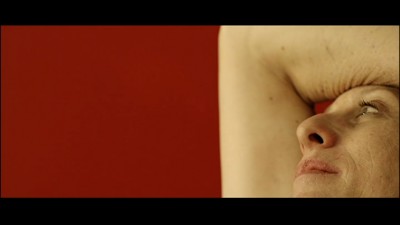
There is a fleeting, exasperating glimmer of a moving, deep, and incisive film lurking somewhere in Yu-Hsiu Camille Chen's very rough, extremely uneven Little Sparrows, which relies for its story upon some of the most basic dramatic components: fraught familial relationships, death, siblings and spouses. But the familiarity of those elements is a neutral quality; they could make for either a universally affecting, disturbing, and profound work, or something mawkish, sentimentalized, and sappily, simplistically "life-affirming." Chen's vision is pulled violently back and forth between both ends of that spectrum, and the torn result is not so much something that cruises, compromised and dull, down the middle of the road as it is an out-of-control picture that can't stop swerving from the intelligent, serious side to the think-positive Oprah side and back again.
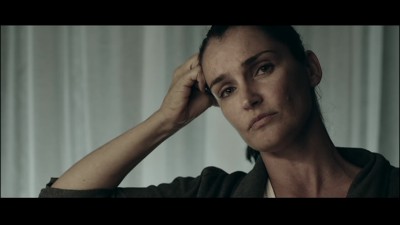
The film's characters, situation, and structure bring to mind, if not the greatness of Bergman's Cries and Whispers (which it seems intent on evoking, with several instances of screen-filling red) then at least the jostling, scattered female siblings of Hannah and Her Sisters; if not the philosophically saturated atmosphere of Rashomon, at least the intriguing, three-times/three-stories structural divisions of Run Lola Run or Rebecca Miller's Personal Velocity. The instigating event for the film's feelings and interactions is the diagnosis of middle-aged, bourgeois-bohemian Australian housewife Susan (Nicola Bartlett)--a wise, insightful mother to her three now grown daughters--with terminal cancer. Their comfortably artistic, well-off family, which lives in and around Perth, Australia, has as its wayward patriarch James (James Hagan), an actor who has spent much time achieving fame and success away from his family, and who will now have to learn to actually be present for his children. (He has been so benevolently narcissistic that Susan even feels the need to tell him half-jokingly, when breaking the news of her impending death, that "this is about me, not about you.") Their daughter Anna (Melanie Munt) has followed in daddy's footsteps, achieving a career as a working actress but coming belatedly to the realization that acclaim and adoration won't save her from her failing marriage and her emotionally reckless extramarital dabblings. Nina (Nina Deasley) seems to have the opposite problem: her husband died years before, leaving her with the children, and her struggle to remain appropriately loyal to an abruptly ended marriage that was not really a very fulfilling one puts her at risk of remaining closed off while her chances to finally have a satisfying relationship pass her by. The youngest sister, Christine (Arielle Gray), is a med student who still lives at home and has avoided telling her family she's a lesbian--a fact she's known since she was a teenager--and dating a woman because she's holding out for them to finally pay enough attention to her to notice that she's "different."
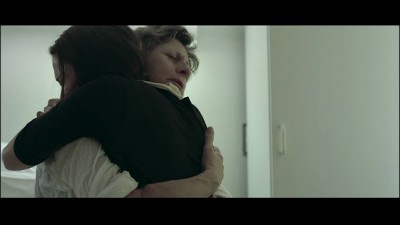
The film is divided into three sections, each of which follows one of the sisters in the days surrounding the intersecting event--the simple, warm, final Christmas of family togetherness that Susan has lovingly planned for them. This structure has some real promise, as do the film's visual aesthetic--a blunt, sparse, fairly raw style that brings to mind the washed-out look of Lars von Trier's Dogme 95-era films (Breaking the Waves, Dancer in the Dark)--and the performances, which, when the actors are given the opportunity, attain a close-in, intense, almost Bergman-like intimacy. Those opportunities are there in Little Sparrows, but they're few and far between, and the other side of the film's nature involves its treacly score ladled thickly over a montage of cheesily "touching" moments, or a faux-sad pseudo-folk tune playing over shots of the characters gazing contemplatively at the sun's reflection in the ocean, apparently thinking the kind of deep thoughts that the film cannot be bothered to have, at least not consistently. Frustratingly, Chen clearly has access to the real, true, complicated, and multifaceted parts of the experience she's fictionalizing, and the film holds out glimpses of that at times, only to then smother it under a sheen of greeting-card glibness. The result is something far too mixed to be really effective, or even cohesive. By apparently giving in to the fear of being too honest, too "depressing" without also offering us a reassuring pat on the head, Chen transforms what we can still see could have been Cries and Whispers material into a Lifetime movie, and that is a long way to fall from your higher aspirations.
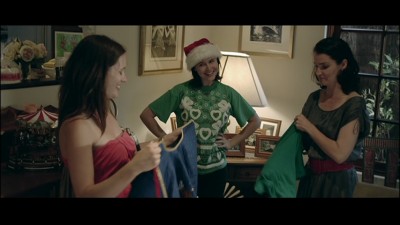
THE DVD:
Little Sparrows, which was shot on a digital RED One camera, has an inherent visual blur and mutedness that is part of its Dogme 95-like aesthetic, as noted above. The anamorphic widescreen, 2.35:1 aspect-ratio transfer itself brings us the film exactly as it is, with no compression artifacting or aliasing. All color and skin tones are as full, stable, and natural-looking as the filmmaker's chosen approach allows for.
Sound:The film is presented with a Dolby digital 2.0 soundtrack that brings the mostly scaled-down sound--intimate dialogue and score--to your speakers with perfect clarity. The film's sound design, like its visual aesthetic, is intentionally plain and immediate, but the room noise and cultivated lack of polish here is fitting, and the digital media is way beyond sufficient to deliver it perfectly to any home theater setup.
Extras:As they do with each of their monthly releases, Film Movement has included a short film on the disc, this time loosely related in theme to the main feature, as Martin Wallner and Stefan Leuchtenberg's A Lost Box of Human Sensation, a 15-minute animated piece, also centers around a parent's death. An unnamed young man (voiced by Joseph Fiennes) has lost his father too early to liver cancer and does not know how to cope with the overpowering loss, and the film traces, through a heavily symbolic animated phantasmagoria that owes more than a little in process and character design to Tim Burton-associated animated projects (The Nightmare Before Christmas, et. al.), the young man's long, tangled grieving process. Ian McKellen reads, in voice-over, a poem composed by Waller addressing the young man's sorrow from the POV of a sometimes compassionate, sometimes sardonic observer, and there are even out-and-out singing/dancing musical moments. These moments feel a little stale and second-hand, though, and the poem is portentous, as is much of the film itself; it does have its charms and even a few delights (such as the moment when the young man's grief-fed self-absorption and coldness is illustrated as he slouches balefully on an edifice that crumbles away to spell out the word "prick"), but A Lost and Found Box of Human Sensation unfortunately lives up to the over-elaborateness of its title, and it generally feels like a lot of desperate, hectic grasping about for a profundity that cannot be attained that way.
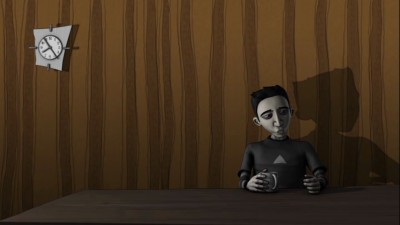
Also included are on-screen-text biographies of director Yu-Hsiu Camille Chen and actors Nicola Bartlett and James Hogan, the Little Sparrows trailer, and a selection of previews for other Film Movement releases.
FINAL THOUGHTS:Little Sparows is a crazy-quilt of the honest and the manipulative; it has the real emotion of conflicted, loving family ties, the experience of death, and the loss of a loved one, all jumbled up with the insulting, tear-jerking version, implying that the bad Hollywood lesson of Dying Young and its ilk was taken too deeply to heart by those behind the camera. If you can maneuver the bizarre shifts in tone and its incredible unevenness, Rent It for its patches of true intelligence and insight, and hope that on her next film, Chen follows her better instincts and resists succumbing to the precious-moments dark side.
|
| Popular Reviews |
| Sponsored Links |
|
|
| Sponsored Links |
|
|
| Release List | Reviews | Shop | Newsletter | Forum | DVD Giveaways | Blu-Ray | Advertise |
|
Copyright 2024 DVDTalk.com All Rights Reserved. Legal Info, Privacy Policy, Terms of Use,
Manage Preferences,
Your Privacy Choices | |||||||















